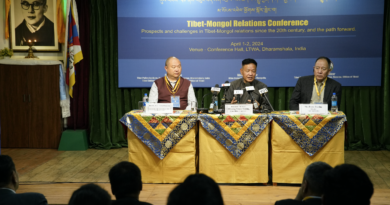China Not Concealing Territorial Ambitions
By: N.S.Venkataraman.
China has recently unveiled its new “standard map” for 2023, incorporating the territories of nearby countries as its own. This action leaves little room for doubt about China’s territorial ambitions. On the contrary, it reinforces the widespread belief that the current leadership in China is resolute in pursuing its territorial expansion plans. China makes no attempt to veil its intentions, having clearly announced them to neighbouring and nearby countries.
Evidently, the mindset of China’s leadership has not improved over the last 75 years, since its aggressive occupation of the Tibet region. During that occupation, thousands of protesting Tibetans lost their lives, and the respected Dalai Lama, along with his followers, was forced to flee to India. China’s past aggression in Tibet and its recent map release both indicate that China seeks to achieve its goals without regard for the means employed.
In this map, China has included territories belonging to India, the Philippines, Malaysia, and Indonesia, asserting them as part of China’s borders. This includes all of the Indian state of Arunachal Pradesh, Aksai Chin, as well as the entire South China Sea.
India, the Philippines, Malaysia, and Indonesia have issued separate statements voicing their opposition to China’s map. However, despite these protests and concerns, China defended the map’s release on August 28th. Clearly, China dismisses the protests from neighbouring countries as inconsequential.
When China occupied Tibet in the 1950s and inflicted suffering upon Tibetans, there were no substantial protests from other countries, allowing China to have its way. Mild murmurs of protest did arise from the USA at the time, but they did not extend beyond that.
China is now openly threatening to occupy Taiwan, despite lacking a legitimate claim to the region. Taiwan emerged as a separate entity only after the Chinese civil war. In reality, if China can assert Taiwan belongs to mainland China, then Taiwan could just as well claim that mainland China belongs to Taiwan. China also has ongoing disputes with Japan regarding the Senkaku Islands.
The question arises: where will China’s territorial expansion ambitions lead? China has engaged in conflicts with India multiple times and still occupies thousands of square kilometers of Indian territory. It currently exerts control over Tibet and maintains a significant military presence there. In summary, China has displayed aggression, and whether it will cease its adventurous pursuits is a pressing concern.
Regrettably, the United Nations Organization has become a toothless entity, incapable of effectively restoring peace in any region. Few countries, including China, appear to take the UNO seriously anymore, as it has become synonymous with endless debate.
Aside from the recently released map incorporating the territories of neighboring countries, China has also gained a significant influence over Pakistan through its economic corridor project and has, to some extent, exerted control over Sri Lanka by acquiring the Hambantota port. Through the “One Belt One Road” (OBOR) initiative, China’s global infrastructure project, it is gradually expanding its influence in several vulnerable countries, particularly in Asia and Africa. China’s economic aggression, backed by substantial debt to these nations, parallels the political aggression it is displaying towards its neighboring countries through the release of the “standard map.”
With China’s remarkable economic and industrial growth over the past few decades, strengthened military capabilities, and substantial technological advancements, it appears that China aspires to become a global superpower. However, it should not be allowed to achieve this goal at the expense of other nations. China’s recent release of the “standard map” is a troubling indicator of its aggressive and unacceptable approach.
Venkataraman is a trustee with the “Nandini Voice for the Deprived,” a not-for-profit organisation that aims to highlight the problems of downtrodden and deprived people and supports their cause. To promote probity and ethical values in private and public life and to deliberate on socio-economic issues dispassionately and objectively.
The Views expressed in this article are that of the author’s and should not be attributed to Tibet Express.






